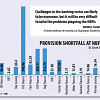Bad loans hit historic high

Default loans in the banking sector of Bangladesh hit an all-time high of Tk 182,295 crore, but no reform programme to reduce it has been announced in the budget for the upcoming fiscal year.
The default loans amounted to Tk 145,633 crore by the end of December. This means it surged by Tk 36,662 crore, or 25 percent, in January-March compared to the preceding quarter, according to the latest data of the Bangladesh Bank.
Besides, non-performing loans (NPLs), also known as toxic assets, climbed by Tk 50,675 crore in the quarter compared to same period of 2023.
The central bank released the figure on a day when Finance Minister Abul Hassan Mahmood Ali unveiled the new government's first budget.
Industry insiders said the rise in NPLs is a result of irregularities, scams, weak corporate governance and a lack of proper monitoring by the central bank.
They also said the actual volume of default loans is higher than the official figure.
At the end of March this year, the total disbursed loans stood at Tk 1,640,855 crore, of which Tk 182,295 crore was defaulted, the highest in the history of Bangladesh. This means 11.10 percent of the disbursed loans have turned sour.
Bad loans in the banking sector stood at only Tk 22,481 crore when the Awami League formed the government in 2009.
When asked for the reason for the spike in bad loans, Bangladesh Bank Executive Director and Spokesperson Md Mezbaul Haque could not give a suitable answer.
He told The Daily Star that bad loans at the state-run banks rose sharply, leading to higher NPLs overall.
Default loans at state-run commercial banks stood at Tk 84,221 crore in March, accounting for 27 percent of their total Tk 312,266 crore disbursed loans, as per BB data.
Scam-hit Janata Bank registered the highest volume of bad loans, contributing Tk 30,495 crore. This represented 31 percent of the loans it had disbursed.
Agrani Bank's bad loans amounted to Tk 20,864 crore, or 28 percent of its disbursed loans.
Moinul Islam, a former professor of economics at Chittagong University, said the actual volume of bad loans is more than Tk 500,000 crore if written-off loans, rescheduled loans and loans with court injunctions are considered.
Ahsan H Mansur, executive director of the Policy Research Institute of Bangladesh, said the default loan figure is not new and it has now been uncovered due to the condition of the International Monetary Fund.
He thinks around 25 percent loans turn defaulted. This will bring the bad loan volume to around Tk 4 lakh crore. "There are bad loans that are yet to be made official. They will be disclosed in the future."
He said the banking sector has weakened due to the higher level of bad loans and it has a negative impact on good borrowers.
Bankers say there is tendency among borrowers to refrain from repaying loans citing excuses of the present economic condition.
On the other hand, most of the loans of the state-run banks were availed through irregularities and scams, and that is why it is difficult to recover those loans.
Bad loans at private commercial banks stood at Tk 88,900 crore, or 7.28 percent of their Tk 1,221,166 crore in disbursed loans.
Default loans at foreign commercial banks stood at 5.20 percent of their disbursed loans and it was at 13.88 percent at specialised banks, central bank data showed.
Moinul Islam said the default loans issue has become a major problem now.
"The government is not taking adequate action against loan defaulters, and that is why their numbers are continuously rising."
Stressed assets, including written-off and rescheduled loans, stood at Tk 377,922 crore till December 2022, central bank data showed.
NPLs have risen at a time when the government has fixed a target to reduce the volume of bad loans as prescribed by the IMF with its $4.7 billion credit programme.
As per the government's direction, the BB has fixed a target to reduce bad loans at the state-run banks to 10 percent by 2026. The target for private commercial banks is 5 percent.
NO REFORM PROGRAMME
The finance minister yesterday did not mention any specific reform agenda for the banking sector, which is struggling with a high NPL ratio, stressed assets, weak financial health, liquidity challenges and weak regulations of the central bank.
In his budget speech for FY20, former finance minister AHM Mustafa Kamal hinted that the government was taking a number of reforms to bring about discipline in the banking sector.
He would go on to refer to such reforms while announcing the next four budgets, but only a few were ever implemented, leading to the sector becoming even more undisciplined.
On January 10, 2019, Kamal said: "NPL becomes a matter of grave concern, but it is still in a manageable position. From today, NPL will not increase."
His predecessor Abul Maal Abdul Muhith also hinted at forming the country's first banking commission in his budget speech for FY16. However, there was no further discussion regarding that topic after FY20.
Fahmida Khatun, executive director of the Centre for Policy Dialogue, recently said an independent banking commission is needed to ensure good governance in the banking sector.
She added that a goal-specific, time-bound, inclusive, transparent, unbiased and independent citizen's commission on banking should be set up to bring transparency.

 For all latest news, follow The Daily Star's Google News channel.
For all latest news, follow The Daily Star's Google News channel. 










Comments